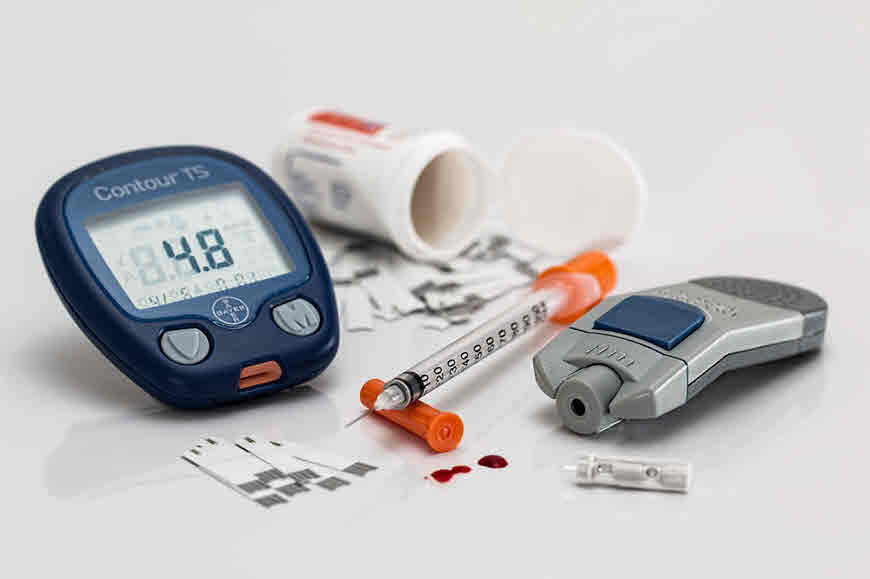Symptoms of diabetes are increased thirst and frequent urination, tired feeling, vague weight loss, and blurred vision. Many people have no symptoms of diabetes and do not know that they have diabetes, each type of diabetes has different causes.

Symptoms of diabetes
Symptoms of diabetes may be the following:
- Increased thirst and urination
- Increase appetite
- Fatigue
- Blurred vision
- Numbness or tingling in the legs or hands
- Not healing of wounds
- Losing weight too fast
Symptoms of type 1 diabetes begin very quickly within a week. Symptoms of type 2 diabetes often develop gradually over the course of several years-and it reduces that you won’t be able to notice them. Many people with type 2 diabetes have no symptoms Some people do not know unless they have other health problems related to diabetes, such as blurred vision or heart discomfort.
Causes of type 1 diabetes
Type 1 diabetes occurs when your immune system, the body’s system to fight infections, attacks on the insulin-producing beta cells of the pancreas and destroys them. Scientists believe that type 1 diabetes is caused by genes and the environment, such as viruses, which can trigger the disease.
Read more about type1 diabetes here
Causes of type 2 diabetes
Type 2 diabetes – the common cause of diabetes is caused by many things including bad lifestyle and genes.
Read more about type 2 diabetes here
Overweight, obesity, and physical inactivity
If you are not physically active and are overweight or obese then you are more likely to have type 2 diabetes. Excess weight sometimes causes insulin resistance and it also makes a difference to what is the fat of the body in people with type 2 diabetes. Excess fat on the abdomen is linked to insulin resistance, type 2 diabetes, heart, and blood vessel disease.
Insulin Resistance
Type 2 diabetes usually begins with insulin resistance, a condition in which insulin is not well used in muscle, liver and fat cells. Your body needs more insulin to enter glucose cells. Initially, the pancreas tries to make more insulin to meet the additional demand for insulin. Over time, the pancreas does not produce enough insulin, and blood sugar levels increase. Read more about insulin resistance
Gene and Family History
Like type 1 diabetes, some genes may make you more likely to develop type 2 diabetes.
Gene can also increase the risk of type 2 diabetes by increasing the tendency of overweight or obesity.
Causes gestational diabetes
Scientists believe that gestational diabetes is a type of diabetes that develops during pregnancy and the causes are genetic and lifestyle as well as hormonal changes of pregnancy.
Insulin Resistance
The hormone produced by the placenta increases insulin resistance, which occurs in all women who are late pregnant. Most pregnant women can produce enough insulin to control insulin resistance, but nothing can be done. Gestational diabetes occurs when the pancreas does not make enough insulin.
With type 2 diabetes, excess weight is associated with gestational diabetes. Women who are overweight or obese are already suffering from insulin resistance when they are pregnant. Too much weight gain during pregnancy can also be one of the reasons.
Gene and Family History
Having a family history of diabetes makes it more likely that a woman will develop gestational diabetes, which shows that genes play a role.
What else can be the cause of diabetes?
Changes in genetics can also be caused by gene mutation, diseases, damage to the pancreas, and some medications.
Changes in genetics
Monogenic diabetes is caused by a mutation or alteration in a gene. These changes usually occur to others through families, but sometimes gene mutations occur on their own, most of these gene mutations reduce the formation of insulin in the pancreas, which causes diabetes. Monogenic diabetes occurs in most newborns and the youth are in the beginning. In the first 6 months of the newborn’s life usually, doctors are detected during adolescence or early adulthood, but sometimes unless the disease is detected in life.
Cystic fibrosis produces thick mucus that damages the pancreas it can prevent the scarred pancreas from making enough insulin.
Hemochromatosis disease causes too much iron store in the body if the disease is not treated, iron can damage the pancreas and other organs.
Hormonal diseases
Due to some hormonal diseases, the body makes some kind of hormones very high, which sometimes causes insulin resistance and diabetes.
Malfunction or remove the pancreas
Pancreatitis, pancreatic cancer, and injury can damage beta cells or make them less able to produce insulin, resulting in diabetes. If the damaged pancreas is removed, the loss of beta cells will cause diabetes.
Medicine
Sometimes some medicines can damage beta cells or disrupt insulin functions. This includes
- Niacin, a type of vitamin B3
- Some types of diuretics, also known as water tablets, are also known as water tablets.
- Anti-seizure drugs
- Mental Medications
- Medications to treat (HIV)
- Pentamyden, a medicine used to treat pneumonia
- Medicines that treat inflammatory diseases such as rheumatoid arthritis, asthma, lupus, and ulcerative colitis